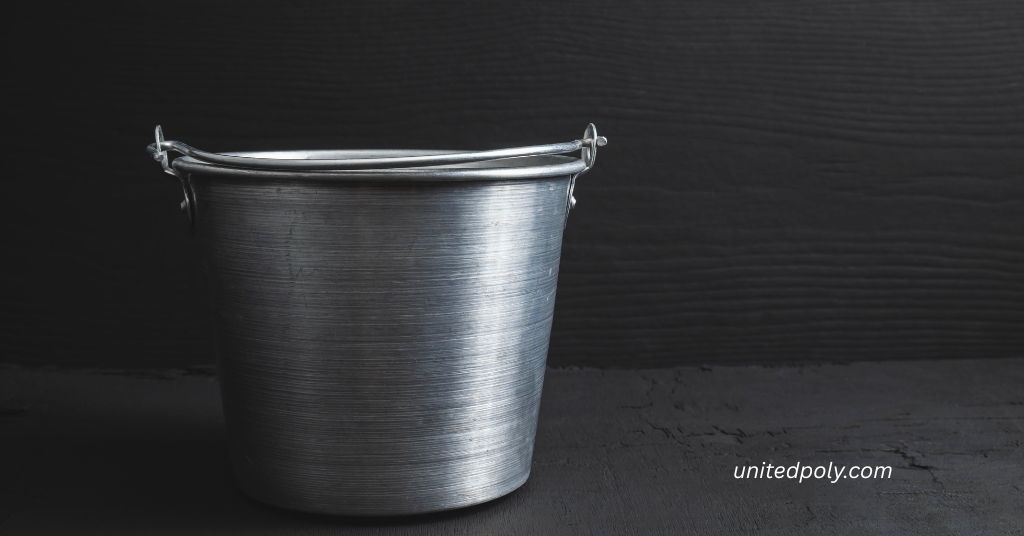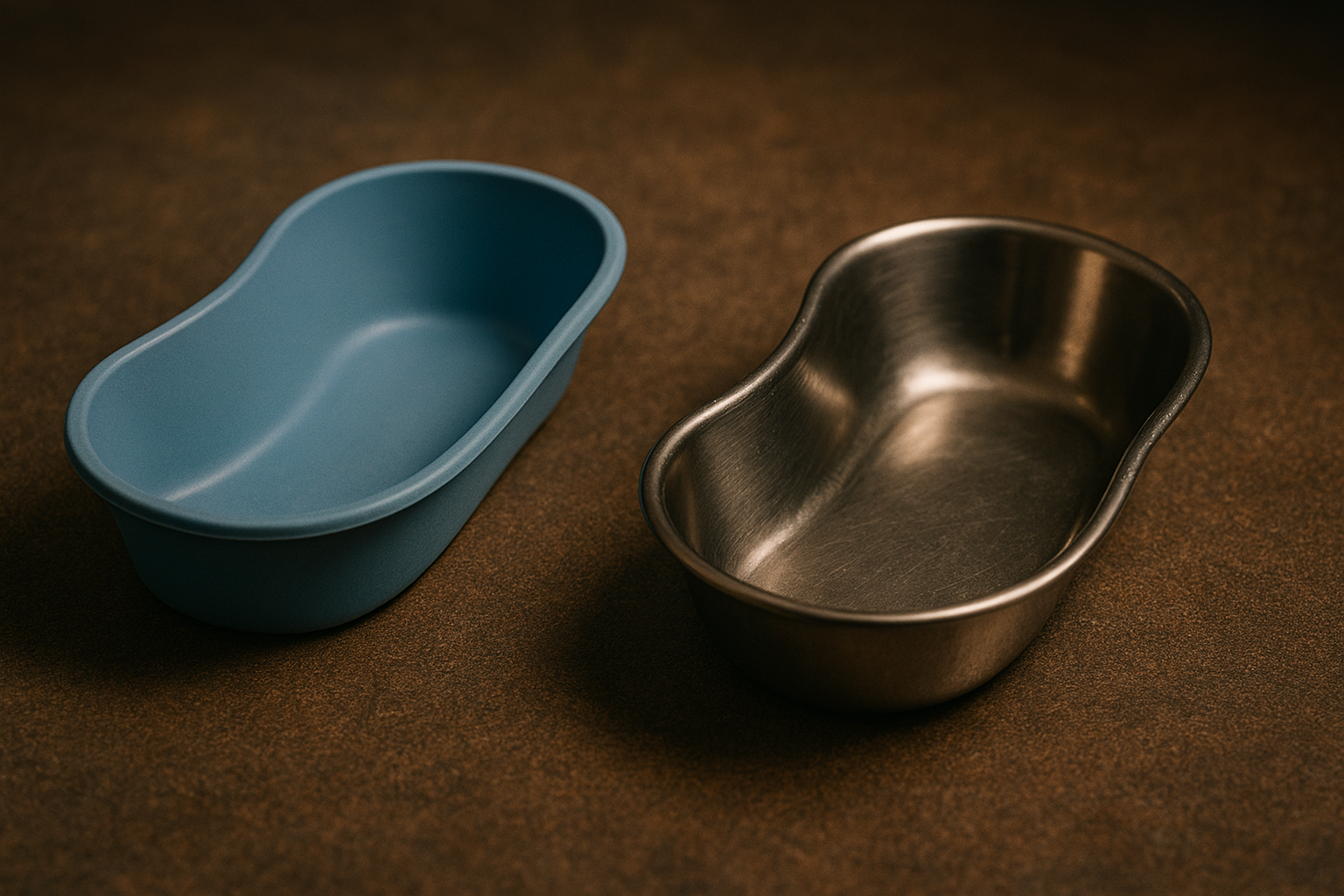Infection control and sterilization are important parts of the healthcare and food industries. It is thus important to ensure proper sanitation of equipment and materials to prevent the spread of infections and maintain a sterile environment in healthcare industries.
Stainless Steel Buckets play a key role in these areas because of their long-lasting nature, corrosion resistance and ease of cleaning.
What are stainless steel medical buckets?
Stainless steel medical buckets are durable, resistant to corrosion and easy to maintain and clean. They are commonly used in hospitals and healthcare settings for various purposes like sterilization, waste disposal and the storage of medical instruments.
The buckets can withstand temperatures and harsh cleaning chemicals, making them ideal for use in sterilization processes like autoclaving. Their smooth and non-porous surfaces ensure they are easy to clean and sanitize, thus preventing the growth of bacteria and pathogens.
The medical buckets are important for maintaining hygiene, controlling infections and ensuring the safety of both patients and healthcare workers in medical environments.
Role of Stainless Steel Buckets in Hospitals
Infection Control and Sterilization
Stainless Steel Medical buckets are used as a part of the sterilization process as they are capable of withstanding high temperatures and harsh chemicals, making them apt for use in environments where contamination control is essential.
Sterilization is the process of eliminating all forms of microbial life, including bacteria, viruses, fungi and spores from surfaces and instruments.
It is achieved through autoclaving, chemical disinfection and dry heat.
Properties of Stainless Steel Bucket- Making them apt for Health Care Settings
Stainless steel buckets are used in healthcare settings. The key properties of stainless steel that contribute to its effectiveness are infection control and sanitization. These buckets are highly resistant to corrosion, particularly exposure to acids, moisture and cleaning agents. This ensures the buckets maintain their integrity even when exposed to harsh chemicals and cleaning solutions. Corrosion resistance is important for ensuring that the equipment does not become a breeding place for bacteria and other contaminants.
The buckets are known for their durability and strength. Unlike plastics or other materials, stainless steel can withstand heavy usage without cracking or breaking, important for maintaining a sterile environment in hospitals.
The buckets can withstand high temperatures without compromising their structural integrity. This makes them ideal for use in sterilization processes like autoclaving where the equipment must withstand high-pressure steam to remove microorganisms.
The stainless steel medical buckets are easy to clean and maintain. They are smooth and non-porous making them easy to clean and sanitize. The stainless steel does not trap dirt, bacteria or pathogens on its surface.
What are the applications of stainless steel buckets in infection control?
- Sterilization of Surgical Instruments: In health care settings, surgical instruments and medical devices must be thoroughly sterilized before use to prevent cross-contamination between patients. The buckets are used to store and transport instruments during the sterilization process. They hold the instruments during the sterilization process ensuring the tools are free from any harmful pathogens before being used in the surgery or other medical procedures. The buckets can withstand the heat and pressure without degrading or warping. The sterilized instruments are stored in buckets, which can be reused without compromising hygiene norms.
- Waste Disposal: The stainless steel buckets are used for the disposal of medical and surgical waste. This includes contaminated bandages, syringes and other disposal materials. The medical buckets are designed with secure lids to contain potentially infectious waste, preventing contamination of the surrounding environment. The buckets are leak-proof, reducing the risk of infection transmission during waste disposal.
- Disinfecting non-sterile items: In addition to sterilization, stainless steel buckets are used for disinfecting non-sterile items like cleaning cloths, gloves and towels. These items must be regularly sanitized in healthcare facilities to avoid cross-contamination. The buckets provide a safe and effective solution for soaking and disinfecting these materials using chemical disinfectants.
- Transporting and Storing Sterile Supplies: To control the infection proper storage and transportation of sterile supplies is important to ensure they remain uncontaminated. The buckets are used to transport sterile items like bandages, dressing and surgical tools while maintaining cleanliness. They are easy to clean and can be sanitized after every use to prevent the growth and breeding of harmful microorganisms.
- Food Transportation: In hospitals, the buckets are used for storage and transportation of food products. They provide a hygienic solution for transporting raw ingredients, prepared meals or food waste. The stainless steel buckets are resistant to contamination, bacteria, mold and other pathogens ensuring the food products remain safe and uncontaminated during handling.
What are the benefits of Sterile Stainless Steel Containers?
- Cost-Effective: The Stainless Steel buckets are cost-effective and long-lasting, minimizing the need for frequent replacements. The initial costs are higher as compared to plastic or other materials; their durability makes them the most cost-effective option in the long run.
- Sustainability: Stainless Steel is a recyclable material, making it a sustainable choice for infection control applications. The buckets can be recycled and reused, contributing to waste reduction in healthcare settings.
- Enhanced Infection Control: The non-porous surface of stainless steel and its corrosion-resistant nature make it a more effective option to control infection. The stainless steel medical buckets help reduce the risk of contamination by preventing the growth of harmful microorganisms, and ensuring the medical supplies and equipment are sterile.
- Safety and Hygiene: The buckets are easy to clean and sanitize, minimizing the likelihood of cross-contamination. With their smooth and non-porous surface, they are less prone to harbouring bacteria and other pathogens, promoting higher norms of hygiene in environments where sanitation is important.
The stainless steel buckets are important in infection control and sterilization. These buckets provide a safe and effective solution for infection control practices.
FAQs
- What are stainless steel medical buckets used for?
The stainless steel medical buckets are used for sterilizing medical instruments, disposal of waste and maintaining hygiene in health care settings. United Poly manufactures and exports premium quality medical buckets at the best price. - Are these stainless steel containers corrosion-resistant?
Yes, the buckets are resistant to corrosion, making them durable and ideal for frequent cleaning and sterilization. - Can the United Poly’s stainless steel buckets be autoclaved?
Yes, the United Poly’s stainless steel medical containers can withstand temperatures and pressure, making them suitable for the autoclaving process.






